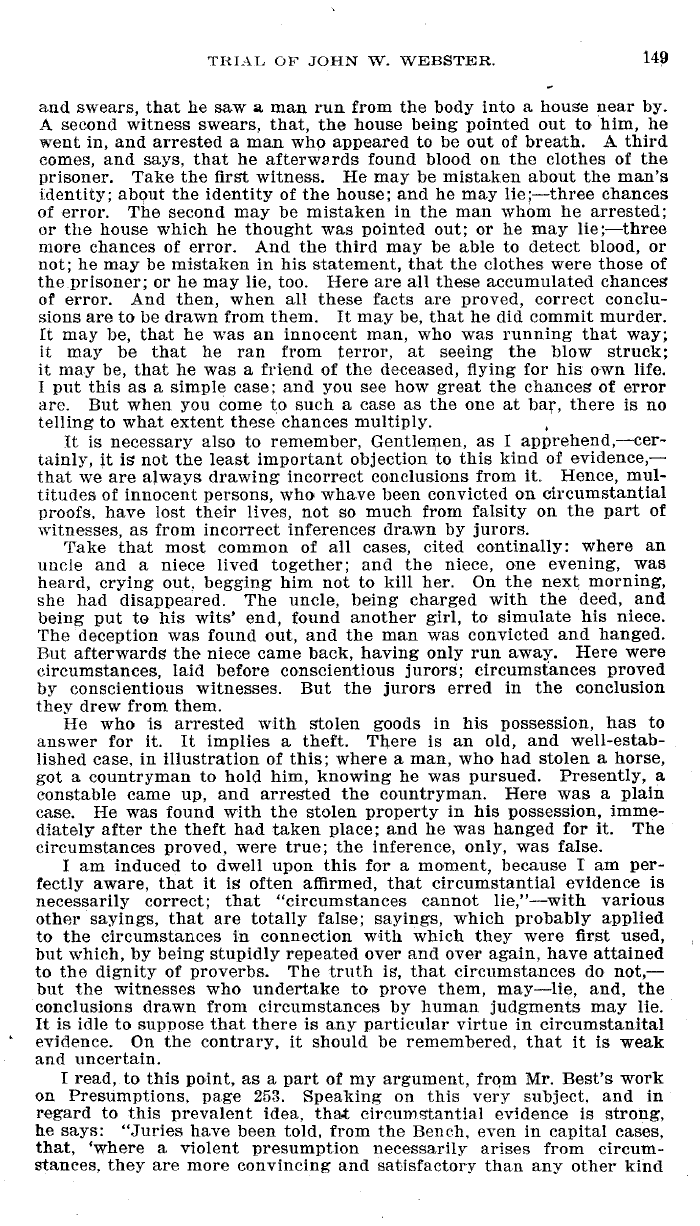|
TRIAL OF JOHN W. WEBSTER. 149
and swears, that he saw a man run from the body into a house near by.
A second witness swears, that, the house being pointed out to him, he
went in, and arrested a man who appeared to be out of breath. A third
comes, and says, that he afterwards found blood on the clothes of the
prisoner. Take the first witness. He may be mistaken about the man's
identity; about the identity of the house; and he may lie; three chances
of error. The second may be mistaken in the man whom he arrested;
or the house which he thought was pointed out; or he may lie; three
more chances of error. And the third may be able to detect blood, or
not; he may be mistaken in his statement, that the clothes were those of
the prisoner; or he may lie, too. Here are all these accumulated chances
of error. And then, when all these facts are proved, correct conclu-
sions are to be drawn from them. It may be, that he did commit murder.
It may be, that he was an innocent man, who was running that way;
it may be that he ran from terror, at seeing the blow struck;
it may be, that he was a friend of the deceased, flying for his own life.
I put this as a simple case; and you see how great the chances of error
are. But when you come to such a case as the one at bar, there is no
telling to what extent these chances multiply.
It is necessary also to remember, Gentlemen, as I apprehend,-cer-
tainly, it is not the least important objection to this kind of evidence,-
that we are always drawing incorrect conclusions from it. Hence, mul-
titudes of innocent persons, who whave been convicted on circumstantial
proofs, have lost their lives, not so much from falsity on the part of
witnesses, as from incorrect inferences drawn by jurors.
Take that most common of all cases, cited continally: where an
uncle and a niece lived together; and the niece, one evening, was
heard, crying out, begging him not to kill her. On the next morning,
she had disappeared. The uncle, being charged with the deed, and
being put to his wits' end, found another girl, to simulate his niece.
The deception was found out, and the man was convicted and hanged.
But afterwards the niece came back, having only run away. Here were
circumstances, laid before conscientious jurors; circumstances proved
by conscientious witnesses. But the jurors erred in the conclusion
they drew from them.
He who is arrested with stolen goods in his possession, has to
answer for it. It implies a theft. There is an old, and well-estab-
lished case, in illustration of this; where a man, who had stolen a horse,
got a countryman to hold him, knowing he was pursued. Presently, a
constable came up, and arrested the countryman. Here was a plain
case. He was found with the stolen property in his possession, imme-
diately after the theft had taken place; and he was hanged for it. The
circumstances proved, were true; the inference, only, was false.
I am induced to dwell upon this for a moment, because I am per-
fectly aware, that it is often affirmed, that circumstantial evidence is
necessarily correct; that "circumstances cannot lie,"-with various
other sayings, that are totally false; sayings, which probably applied
to the circumstances in connection with which they were first used,
but which, by being stupidly repeated over and over again, have attained
to the dignity of proverbs. The truth is, that circumstances do not,-
but the witnesses who undertake to prove them, may-lie, and, the
conclusions drawn from circumstances by human judgments may lie.
It is idle to suppose that there is any particular virtue in circumstanital
evidence. On the contrary, it should be remembered, that it is weak
and uncertain.
I read, to this point, as a part of my argument, from Mr. Best's work
on Presumptions, page 253. Speaking nn this very subject, and in
regard to this prevalent idea, that circumstantial evidence is strong,
he says: "Juries have been told, from the Bench, even in capital cases,
that, `where a violent presumption necessarily arises from circum-
stances, they are more convincing and satisfactory than any other kind
|

